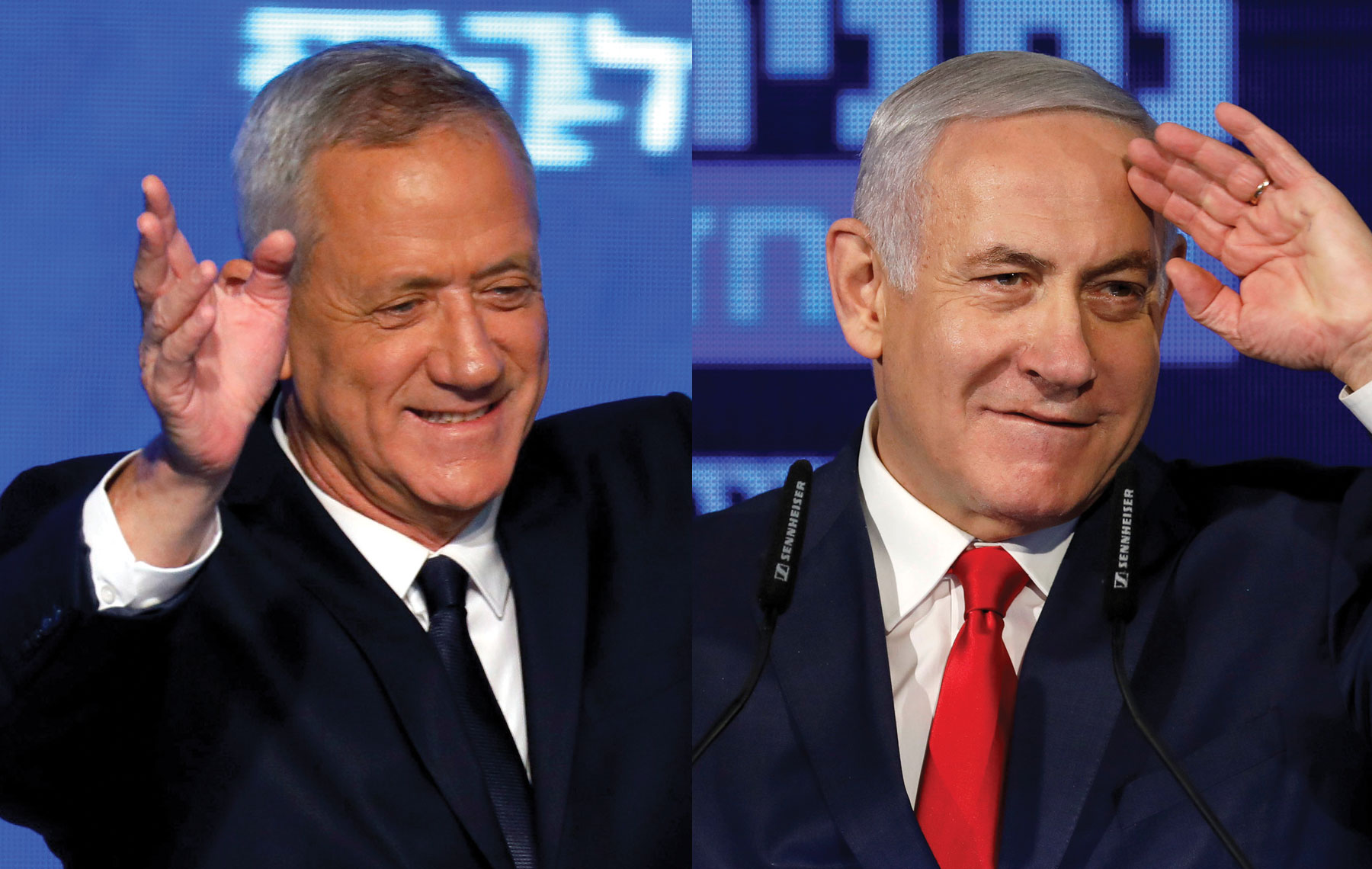 From left: Benny Gantz; Prime Minister Benjamin Netanyahu Photos by Amir Cohen/Reuters
From left: Benny Gantz; Prime Minister Benjamin Netanyahu Photos by Amir Cohen/Reuters Update: This article has been updated to reflect Knesset Speak Yuli Edelstein’s resignation.
The fear is real and understandable. Throughout history, often a crisis has been a prelude to a political coup. And now there’s a crisis in Israel. And political tension. And profound ideological disagreement about the most vital issue: the rules of the political game. So, some Israelis have begun to worry that Israel is becoming a non-democratic state.
I’m not that worried. I think that the fear is somewhat manufactured, and that it is, in fact, part of the game. That is to say: There are leaders and parties who have an interest in creating the impression that democracy is in danger. It’s a tool they use against Prime Minister Benjamin Netanyahu and his government. Nevertheless, there’s no denying that Israel is in the throes of a twofold crisis, one that it shares with the rest of the world — a public health and economic crisis — and the other, political. Apparently, three rounds of elections without a clear outcome is not a recipe for calm and stability.
What happened this week? The Supreme Court ruled against Speaker of the Knesset Yuli Edelstein and demanded that a vote to elect a new speaker take place. (However, on March 25, Edelstein resigned). By doing this, it deepened Israel’s political crisis in two ways. First, it ignited a rebellious mood among government ministers, some of whom went so far as to advocate for disobeying the court’s ruling. Second, it decreased the likelihood that a unity government would be formed. Netanyahu repeatedly warned that if Blue and White moved forward with a vote to elect a speaker of its choice, a unity government would no longer be an option. If this is his final word, Israel is in a bind. No party can form a stable government. A fourth election might be the only solution. But how does a nation hold an election during a pandemic?
The court’s critics believe that its decision to intervene in Knesset procedures is the real threat to the democratic process.
The justices argued in their detailed ruling that the attempt to prevent a majority from electing a new speaker “undermines the foundations of the democratic process.” Their critics believe that their decision to intervene in Knesset procedures is the real threat to the democratic process. Thus, a debate that begins with political maneuvers becomes one about core values with each side arguing that the other side is using undemocratic means to win a political battle.
So yes, this is dangerous. When we shift from a battle of politics to a battle of values, the result is often destructive. Netanyahu can compromise with a rival because of political necessity but it’s harder for him to compromise with a rival whom, he believes, uses undemocratic means to undermine him. Blue and White leader Benny Gantz can compromise with a rival because of political necessity but it’s harder for him to compromise with a rival whom, he believes, is a threat to democracy itself.
The public discourse is poisoned by a mutual sense of anger. Rather than think, “We did not have sufficient political success and therefore must bargain,” the parties think, “We were robbed by our rivals and therefore must take revenge.” Whether the court had to act the way it did is an interesting and separate debate (I think not). But even if one believes that the ruling was necessary, it complicates an already complicated situation. Justices are not good judges of the political arena, as was evident again in this recent ruling. Just consider these two detached-from-reality statements: “Political calculation,” the justices wrote, “does not have a place” in determining the Knesset’s agenda. And no, they’re not worried that a speaker who comes from the opposition could undermine the government’s work because they’re confident that “whomever is elected” will act with the necessary self-restraint.
Sadly, restraint is hardly our politicians’ most common quality. And thus, even though they all understand — and admit — that a unity government is the only viable solution to Israel’s twofold crisis, they seem to be walking away from it. In fact, by walking away from it, they raise the prospect for the riskiest political crisis: A march toward a fourth election that Israel cannot hold.
Shmuel Rosner is senior political editor. Check out more analysis of Israeli and international politics at the Jewish Journal.























 More news and opinions than at a Shabbat dinner, right in your inbox.
More news and opinions than at a Shabbat dinner, right in your inbox.